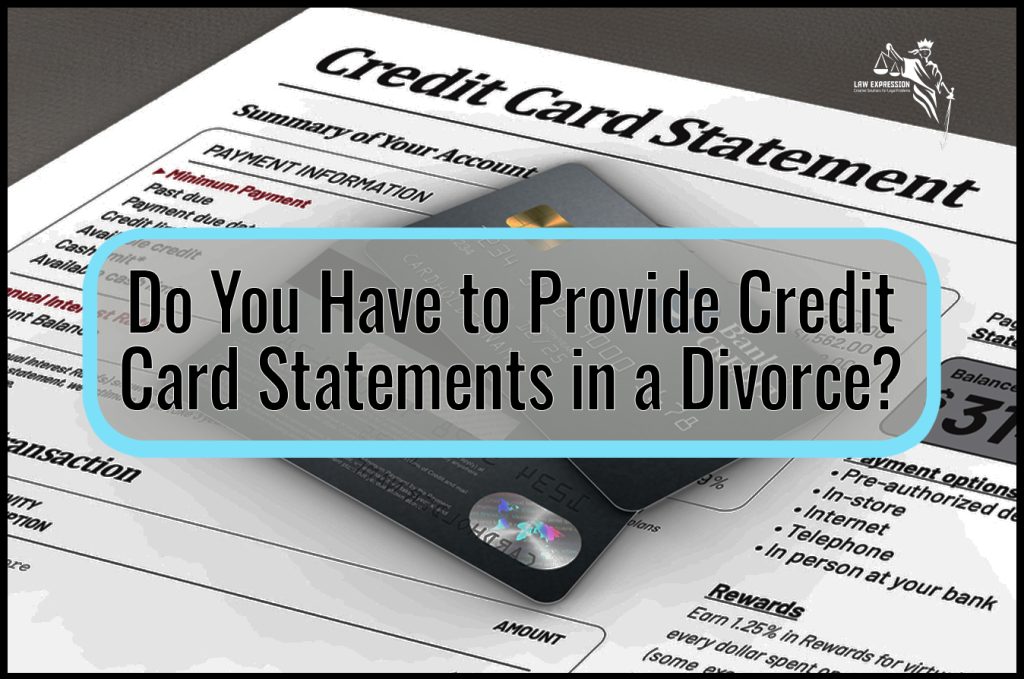Do You Have to Provide Credit Card Statements in a Divorce?
If you’re going through a divorce, you may be wondering if you need to provide your credit card statements. The answer is that it depends on the situation. If you and your spouse are in agreement about the division of assets and debts, then you likely won’t need to provide any financial documentation.
However, if there is a dispute about who should pay what, then the court may request financial records including credit card statements.
If you are going through a divorce, you may be wondering if you need to provide credit card statements as part of the process. The answer is that it depends on your particular situation. If you and your spouse have joint credit cards, the court will likely require you to provide statements for those accounts.
However, if you have separate credit cards, the court may not require you to provide statements for those accounts. Ultimately, it is up to the judge to decide what financial information is relevant to the case and what should be considered during the divorce proceedings.
How Do I Protect My Credit During a Divorce?
When you divorce, it’s important to take steps to protect your credit. Here are some tips:
1. Keep track of your credit report and score.
This will help you spot any changes that may occur during the divorce process.
2. Inform your creditors that you are going through a divorce. This will help them understand your situation and may prevent them from taking negative action against you (such as closing your account).
3. Make sure all joint accounts are closed or transferred to one party before the divorce is final. This will prevent both parties from being liable for the debt.
4. Keep up with your payments on all accounts, even if they are in your spouse’s name only.
Late payments can damage your credit score, so it’s important to stay on top of things.
5. If you have any shared assets, such as a car or house, make sure they are paid off before the divorce is final. Otherwise, you may be responsible for the debt even after the asset is transferred to your spouse.

What Should You Not Forget in a Divorce Agreement?
If you are getting a divorce, there are certain things that you should not forget in your divorce agreement. First and foremost, Child Support should be included in the agreement. This will ensure that your children are taken care of financially after the divorce.
Additionally, Alimony payments should also be included if one spouse is financially dependent on the other. Finally, any shared property or assets must be divided between the two spouses in the agreement.
What is the Purpose of a Financial Statement in a Divorce?
In a divorce, financial statements are used to help determine each spouse’s income and assets. This information is then used to divide the couple’s property and debts fairly. Financial statements can also be used to determine spousal support payments.
Can My Ex-Wife Subpoena My Bank Records After Divorce?
If you’re asking whether your ex-wife can subpoena your bank records after divorce, the answer is maybe. It depends on the state in which you live and the specifics of your divorce agreement. In some states, financial information is automatically included in the public record after a divorce.
That means anyone – including your ex-wife – could request and receive copies of your bank records. Other states allow financial information to be sealed from the public record, which would prevent your ex-wife from accessing your bank records without a court order. If your state allows financial information to be sealed and you have an agreement with your ex-wife that she will not request access to your bank records, then she likely won’t be able to subpoena them.
However, if there’s no such agreement in place or if her attorney believes she has a good reason to see the records (for example, if there’s reason to believe you’re hiding assets), then she could attempt to subpoena them. Ultimately, it’s up to the judge to decide whether or not to grant a subpoena for bank records in a divorce case. If you’re concerned about your ex-wife being able to access your financial information, talk to an experienced family law attorney in your state for more specific advice.
Credit Card Debt Division During Divorce
Divorce Credit Card Statements
If you’re going through a divorce, one of the many things you’ll need to deal with is dividing up your credit card statements. This can be a tricky process, but there are a few things you can do to make it a little easier. First, sit down with your soon-to-be ex and decide who will keep which cards.
It’s important to be fair about this – if one person has all the good credit cards and the other has all the bad ones, that’s not going to be helpful in the long run. Once you’ve decided who gets which cards, you’ll need to go through each statement and figure out who owes what. This can be a complicated process, so it’s best to sit down with a financial advisor or accountant to help you figure it all out.
Once you’ve divided up the debts, it’s important to close any joint accounts that you have. This way, both parties are completely responsible for their own debts and there’s no risk of one person racking up a huge bill that the other is then responsible for. If possible, it’s also a good idea to get new credit cards in your own name so that there’s no confusion about who is responsible for what.
Dividing up credit card debt during a divorce can be tricky, but by following these tips you can make sure that everything is fair and square.
Conclusion
In a divorce, you may be asked to provide credit card statements as part of the discovery process. This can be helpful in determining things like spousal support or property division. However, there are some limits to what credit card statements can be used for in a divorce.
For example, they cannot be used to prove adultery. If you have questions about what credit card statements can be used for in your divorce, you should talk to an experienced family law attorney.


